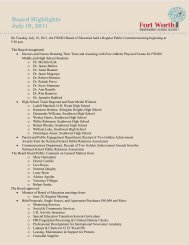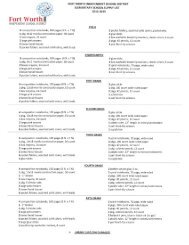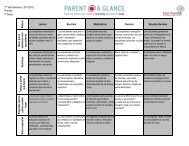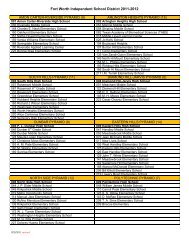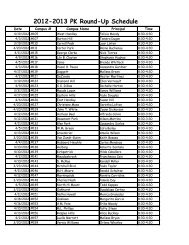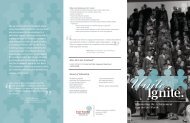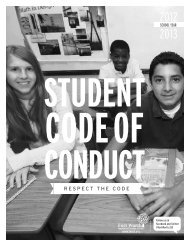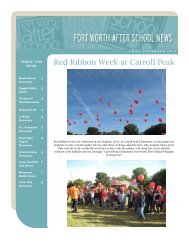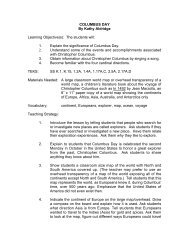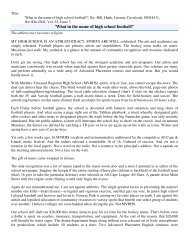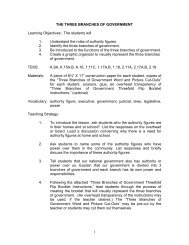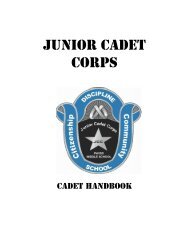Bulletin One 2012 2013 Final.pdf - Fort Worth ISD
Bulletin One 2012 2013 Final.pdf - Fort Worth ISD
Bulletin One 2012 2013 Final.pdf - Fort Worth ISD
Create successful ePaper yourself
Turn your PDF publications into a flip-book with our unique Google optimized e-Paper software.
ceased. If possible, gloves should be kept in any area where one may anticipate contact with<br />
body fluid (wood shop, labs, and special education classrooms). Clothing and other<br />
nondisclosure items (e.g., towels used to wipe up body fluid) that are soaked through with<br />
body fluids should be placed in plastic bags. Clothing should be sent home for laundering.<br />
Contaminated disposable items (e.g., tissues, paper towels, diapers) should be handled with<br />
disposable gloves. Changing tables must be cleaned with a FW<strong>ISD</strong> disinfectant after each<br />
student is changed.<br />
B. Students should be taught to handle their own ―body fluids‖ as appropriate (for age, state of<br />
health, etc.). When feasible, students should dispose of their own tissues after blowing nose,<br />
apply pressure to nose and dispose of the paper towels used for bloody nose; wash own<br />
scrapes/cuts, etc.<br />
C. Students should be taught good hand-washing techniques and encouraged to use them<br />
routinely--before eating, after toileting, after vomiting, etc.<br />
3.10 Administration of Medication<br />
I. Texas law permits a public school to administer medication prescribed by a physician/licensed<br />
health care provider to a child on behalf of the parent or legal guardian under certain limited<br />
circumstances with an appropriate written authorization. The only medication that may be given<br />
at school is that which is necessary to enable the student to remain in school. If possible, all<br />
medication should be given outside of school hours. Three-times-a-day medications can be given<br />
before school, after school and at bedtime. If necessary, medication can be given at school under<br />
the following condition.<br />
II. Medications must be in original, properly labeled containers. The pharmacy can supply two (2)<br />
labeled bottles for this purpose. Medications sent in baggies or unlabeled containers will not be<br />
given.<br />
III. Medications will not be given without a specific written request signed by at least one parent or<br />
legal guardian and physician. This request should be made on the appropriate form supplied by<br />
the school or on a form supplied by the physician.<br />
IV. Medications may be given by a staff member designated by the principal and trained by the school<br />
nurse. All designated staff members must be in-serviced by the school nurse before administering<br />
any medication to students.<br />
V. All medications must be kept in the nurse’s office in a locked cabinet except for students whose<br />
doctor/licensed health care provider has completed a Self-Administration of Prescribed Asthma or<br />
Anaphylaxis Medication by Student form or a comparable written authorization that complies<br />
with District Board Policy. If a student allows another student to use this medication, the privilege<br />
will be revoked.<br />
VI. Medication containers will be returned to the students at the end of the month or when the<br />
container is empty. Parents should send only the amount of medication needed for one (1) week<br />
to one (1) month. Additional medication will be returned to the parent.<br />
12-13 SY <strong>Bulletin</strong> Number <strong>One</strong> 52 Revised: 10/9/<strong>2012</strong>



